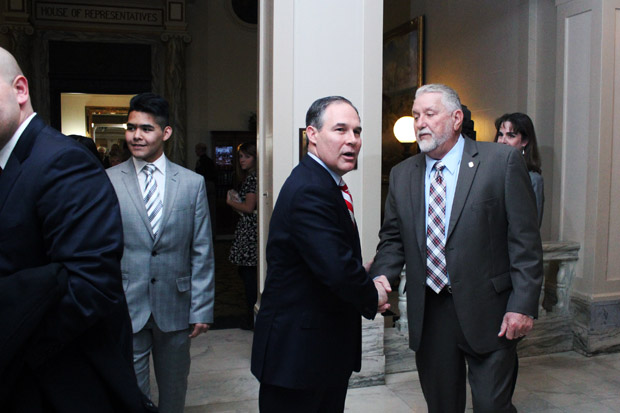
Oklahoma Attorney General Scott Pruitt shakes hands at the state capitol after the 2014 State of the State address.
Joe Wertz / StateImpact Oklahoma


Oklahoma Attorney General Scott Pruitt shakes hands at the state capitol after the 2014 State of the State address.
Joe Wertz / StateImpact Oklahoma

Joe Wertz / StateImpact Oklahoma
Oklahoma Attorney General Scott Pruitt shakes hands at the state capitol after the annual State of the State address.
Oklahoma Attorney General Scott Pruitt confirmed Monday that he has worked with the energy industry to push back against the U.S. Environmental Protection Agency and the Obama administration’s regulatory agenda, but denied how The New York Times characterized those efforts, which were detailed in a story published over the weekend.
Pruitt’s alliance with energy companies isn’t a secret at all, basically. The Oklahoman‘s Randy Ellis reports:
“I don’t think there is anything secretive in what we’ve done,” Pruitt said. “We’ve been very open about the efforts of my office in responding to federal overreach.”
Pruitt said something similar in response to an inquiry by The Journal Record, the paper’s Marie Price reports:
“It should come as no surprise that I am working diligently with Oklahoma energy companies, the people of Oklahoma and the majority of attorneys general to fight the unlawful overreach of the EPA and other federal agencies,” Pruitt wrote in an emailed statement.
The Times story, by reporter Eric Lipton, painted Pruitt as a rising star in the Republican Attorneys General Association and a principal founder of the so-called Rule of Law Campaign, where by “attorneys general band together to operate like a large national law firm” to challenge Obama on issues like environmental regulations and the Affordable Care Act.
The Times story included Open Records Act-sourced documents that show a letter Pruitt sent to the EPA accusing it of overestimating air pollution from natural gas drilling was actually written by attorneys representing Devon Energy.
But Pruitt told The Oklahoman he signs his name to a lot of letters he didn’t draft:
Pruitt said his office frequently signs on to friend of the court briefs and letters originated by other states, when it agrees with their positions.
“Many times we sign on to those amicus (friend of the court) requests or we sign on to those letters without any changes and the reason we do so is we agree with the content of the communication or the brief that is being filed in the court,” he said.
“Here it was no different. Here was a situation a constituent, an Oklahoma company, made us aware of the overreach of the BLM (Bureau of Land Management) around something as important as hydraulic fracturing.”
“That’s actually called representative government in my view of the world,” he said.
…
“What the New York Times failed to address was that we were right,” Pruitt said. “The communication was a communication that goes to the heart of state primacy and state sovereignty and the regulation of hydraulic fracturing and that the BLM was exceeding its authority. They haven’t acted, because they don’t have that authority, to date.”